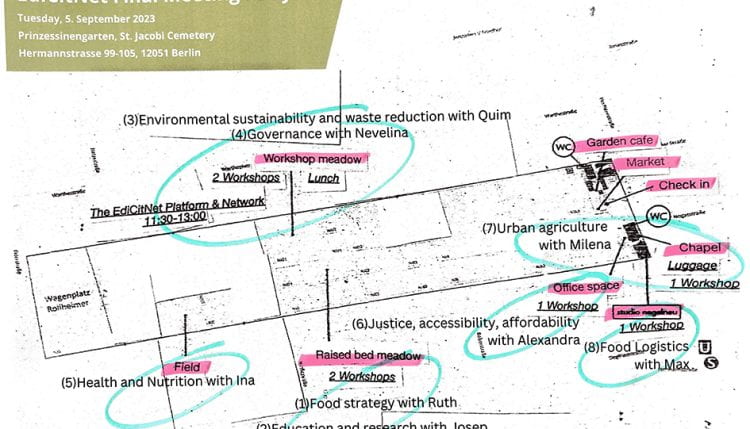
Final project meeting of the EdiCitNet project
During the last two days, the final meeting of the Horizon2020 EdiCitNet innovation action project took place in Berlin. The more than 30 consortium partners joined once more to reflect on the successes, challenges and failures of this international project, funded by the EU under their programme group “Smart and Sustainable Cities” in the subject area of “nature-based solutions”.
Over the past five years, the project – fully titled Edible Cities Network: Integrating Edible City Solutions for social resilient and sustainably productive cities – has been working towards making cities around the world better places to live through the implementation and institutional integration of food-focused nature-based solutions. At the final meeting, the partners – including universities, research institutes, local city administrations, non-governmental organisations (NGOs) and small and medium enterprises (SMEs) – discussed the key lessons learned during the project. The city teams of the four “Front-Runner Cities” presented different edible city solutions that were trialed in their communities – from community-supported agriculture programmes and water recycling technologies to networking strategies for green city initiatives – in their living labs. The representatives of the city teams of the seven “Follower Cities” spoke about the experiences with co-developed food-focused master plans in their specific urban contexts and how those helped to tackle specific societal challenges.
The EdiCitNet project draws inspiration from Bohn’s and Viljoen’s design research into Continuous Productive Urban Landscape (CPUL) with explicit reference to the CPUL concept. As a consortium partner, the University of Brighton team was mainly involved in facilitating the coherent integration of urban agriculture and food issues into urban planning strategies in the European and international “Follower Cities”. They co-developed food-focused Opportunity Maps with the cities as well as advise on issues around urban agriculture, urban food systems, productive urban landscape and co-design processes.
For the EdiCitNet project see the project’s own website.
For the Prinzessinnengärten Kollektiv see the project’s own website.
For Bohn&Viljoen’s CPUL Opportunity Mapping Method see here.
Image: The 2nd day of the meeting was organised by project partner Prinzessinnengärten on their site at Neue Jakobifriedhof. (source: Prinzessinnengärten 2023)
